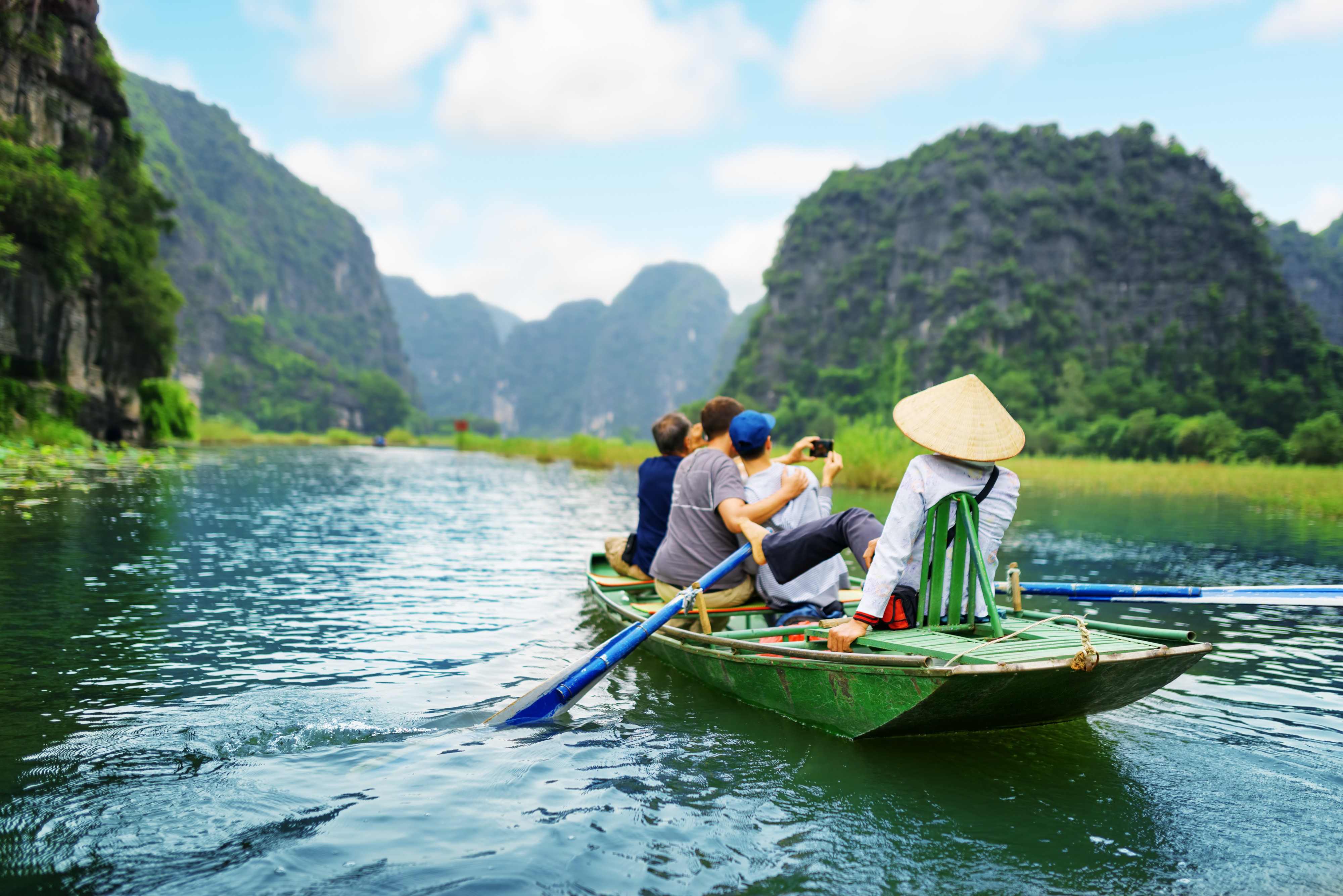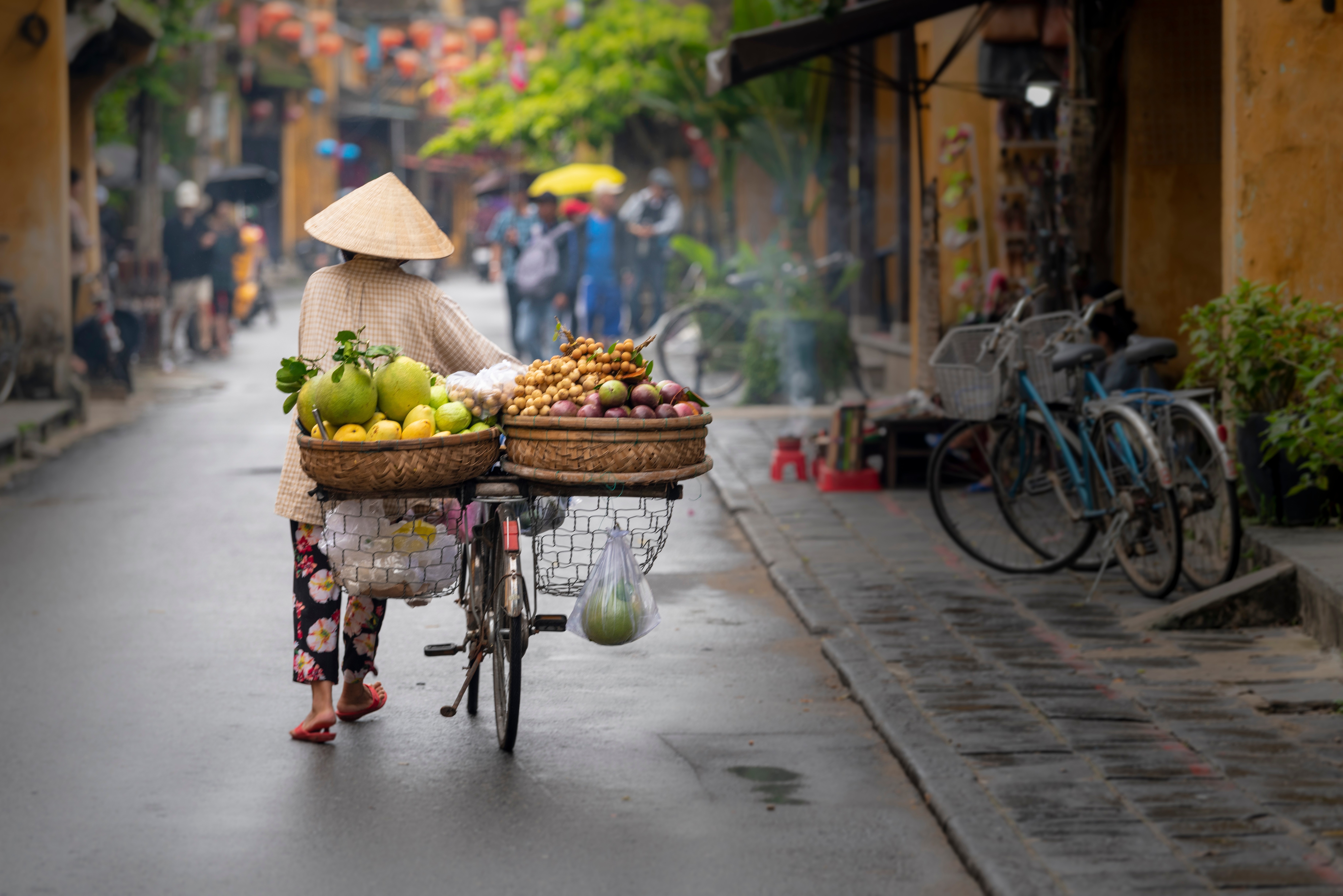Is It Safe To Travel Vietnam? Absolutely! Vietnam is a fantastic destination offering a captivating blend of culture, history, and natural beauty. TRAVELS.EDU.VN ensures your journey is not only memorable but also safe and secure with detailed insights and tailored travel solutions. Explore Vietnam with peace of mind, knowing we’ve got you covered with up-to-date safety advice, travel tips, and support. Let us help you plan your adventure with confidence, focusing on safety guidelines, local customs, and reliable travel partners.
1. Vietnam Safety: An Overview
1.1. Safety Statistics for Vietnam
Vietnam generally enjoys a reputation as a safe country for travelers. Its cities are relatively secure, particularly concerning personal safety. According to the Global Peace Index, Vietnam ranks 41st out of 163 countries, indicating a high level of peace and safety. However, like any travel destination, certain precautions are necessary. Petty theft can occur, especially in crowded tourist areas. Political stability is generally strong, although the government maintains tight control over freedoms. Health risks are present, including mosquito-borne diseases, but these can be mitigated with proper precautions. Overall, Vietnam presents a low-risk environment for tourists who take sensible safety measures.
1.2. City Safety Ratings
Vietnam’s two major cities, Hanoi and Ho Chi Minh City, offer distinct safety profiles. GeoSure Global data shows both cities score well in personal safety and healthcare. However, they rank lower in basic freedoms due to government controls. Numbeo’s safety ratings place Hanoi higher (98th safest out of 311 cities) than Ho Chi Minh City (204th). The Economist’s Safe Cities Index ranked Ho Chi Minh City 45th out of 60 cities, with strong health security but weaker information security. These ratings suggest that while both cities are generally safe, travelers should be aware of potential risks related to theft and political freedoms.
1.3. Nationwide Safety Rankings
Vietnam’s safety is reflected in various global indices. The Global Peace Index ranks Vietnam 41st safest out of 163 countries, highlighting its overall stability. Global Finance places Vietnam 49th out of 134 countries in safety rankings, aligning with the World Economic Forum’s assessments. Numbeo ranks Vietnam 57th out of 146 countries, indicating moderate safety levels. Berkshire Hathaway Travel Protection’s Safest Countries Ratings positioned Vietnam 30th out of 42 countries in 2024, showing an improvement from the previous year. These rankings confirm Vietnam’s standing as a reasonably safe destination, though risks remain.
2. Official Travel Advisories
2.1. U.S. State Department Advisory
 tourists in rowboat on river
tourists in rowboat on river
The U.S. State Department gives Vietnam a Level 1 travel advisory, recommending travelers exercise normal precautions. Despite this, the State Department provides specific safety advice. It warns against accepting balloons of nitrous oxide in nightclubs and consuming snacks from strangers, which might be laced with drugs. Petty crime increases during Tet (Lunar New Year) and Christmas. The State Department advises against renting motor scooters due to frequent disregard for traffic laws. Overall, the advisory suggests that while Vietnam is generally safe, travelers should remain vigilant and follow recommended precautions to ensure their safety.
2.2. Specific Warnings and Recommendations
The U.S. State Department’s specific warnings highlight potential risks in Vietnam. Travelers should avoid accepting nitrous oxide balloons and consuming food from strangers to prevent drug exposure. Increased vigilance is advised during Tet and Christmas due to higher petty crime rates. Renting motor scooters is discouraged due to unsafe driving conditions. These recommendations aim to help travelers avoid common pitfalls and ensure a safer experience. By staying informed and cautious, visitors can minimize risks and enjoy their trip to Vietnam with greater peace of mind.
2.3. Embassy and Consulate Information
For U.S. citizens traveling in Vietnam, knowing the locations and contact details of the U.S. Embassy and Consulate is crucial. The U.S. Embassy in Hanoi and the U.S. Consulate General in Ho Chi Minh City provide essential services, including assistance with lost passports, emergencies, and legal issues. Maintaining these contacts ensures that travelers have access to support and resources if needed. The Embassy and Consulate also offer up-to-date travel advisories and safety information, helping visitors stay informed about potential risks and necessary precautions during their stay in Vietnam.
3. Health and Safety Details
3.1. Crime in Vietnam
Petty theft is the most prevalent crime affecting tourists in Vietnam, often perpetrated by thieves on motor scooters in crowded urban areas. Common targets include cellphones, purses, cameras, and backpacks. The State Department advises keeping valuables secure. Using cut-proof shoulder bags or backpacks provides an extra layer of protection. If theft occurs, reporting it to the local police and the U.S. Embassy or Consulate is essential. Exercising standard precautions, such as avoiding walking alone at night and staying in well-lit areas, further reduces the risk. Being cautious and aware helps ensure a safer travel experience in Vietnam’s cities.
3.2. Health Risks and Precautions
Vietnam’s healthcare system is basic, and doctors often require upfront payment before treating foreign patients. English proficiency among doctors may be limited. Severe illnesses or injuries may require medical evacuation to Thailand or Japan. Rural areas have sparse healthcare resources, with potential shortages of medicines. Carrying comprehensive travel insurance that covers emergency medical evacuation is advisable. Travelers should bring an ample supply of prescription medications, along with prescriptions, and declare them to Vietnamese authorities upon arrival. Taking these precautions helps mitigate potential health-related challenges during travel in Vietnam.
3.3. Common Health Threats
Mosquito-borne diseases, including malaria, dengue fever, and Zika, pose common health threats in Vietnam. Using mosquito repellent with a high concentration of DEET and reapplying it frequently is crucial. Poisonous snakes, spiders, and centipedes are present in rural areas. Bats can transmit diseases, and saltwater crocodiles can be a concern in some regions. Despite these threats, Vietnam generally has fewer creepy-crawlies compared to other tropical countries. Taking appropriate protective measures, such as wearing insect repellent and being cautious in natural environments, helps minimize the risk of these health threats.
4. Safe Travel Practices in Vietnam
4.1. Transportation Safety
 woman walking down street with fruits
woman walking down street with fruits
Transportation safety in Vietnam requires careful consideration. Taxis and ride-hailing services like Grab are generally safe and reliable options in urban areas. When using taxis, ensure the meter is running or agree on a fare beforehand to avoid overcharging. Motorbike taxis (xe ôm) are common but can be riskier due to traffic conditions; if used, always wear a helmet. Buses and trains are available for longer distances, offering affordable and relatively safe travel. However, personal belongings should be monitored for theft. Avoiding self-driving, especially motor scooters, is recommended due to heavy traffic and different driving standards. By choosing reputable transport options and staying vigilant, travelers can enhance their safety on Vietnam’s roads.
4.2. Food and Water Safety
Food and water safety are important aspects of staying healthy in Vietnam. Drinking bottled water is essential to avoid waterborne illnesses. When eating out, choosing reputable restaurants and street food vendors is advisable. Ensure food is thoroughly cooked and served hot to minimize the risk of food poisoning. Raw fruits and vegetables should be washed properly. Being cautious about ice in drinks is also wise. Travelers with sensitive stomachs may want to avoid very spicy or unfamiliar foods initially. By practicing good food and water hygiene, visitors can enjoy Vietnam’s culinary scene while protecting their health.
4.3. Cultural Sensitivity and Respect
Cultural sensitivity and respect are vital for a positive travel experience in Vietnam. Dressing modestly when visiting temples and religious sites is appreciated. Learning a few basic Vietnamese phrases, such as “xin chào” (hello) and “cảm ơn” (thank you), shows respect and can enhance interactions with locals. Bargaining is common in markets, but it should be done respectfully and with a smile. Public displays of affection may be frowned upon in some areas. Understanding and adhering to local customs helps travelers avoid unintentional offense and fosters a welcoming environment, ensuring a more enriching and respectful visit to Vietnam.
5. Specific Safety Concerns
5.1. Political Stability and Freedoms
Vietnam is politically stable, but it’s crucial to be aware of the limitations on personal freedoms. The government maintains tight control over speech, assembly, and media. Discussions about sensitive political topics should be avoided in public. Participating in unauthorized protests or gatherings can lead to serious consequences. Travelers should refrain from distributing political materials or engaging in activities that could be perceived as critical of the government. Respecting these boundaries ensures compliance with local laws and avoids potential legal issues. Being mindful of these restrictions allows visitors to navigate Vietnam’s political landscape safely and responsibly.
5.2. LGBTQ+ Safety
LGBTQ+ safety in Vietnam has improved, but awareness and caution are still advisable. While homosexuality is legal, social attitudes vary, and public displays of affection may attract unwanted attention in more conservative areas. Major cities like Hanoi and Ho Chi Minh City are generally more accepting. LGBTQ+ travelers should research local attitudes and be discreet when necessary. Some hotels and establishments are openly LGBTQ+-friendly. Staying informed and exercising discretion helps ensure a comfortable and safe experience for LGBTQ+ visitors in Vietnam.
5.3. Nighttime Safety
Nighttime safety in Vietnam requires increased caution, especially in urban areas. Walking alone at night should be avoided, particularly in poorly lit or unfamiliar neighborhoods. Sticking to well-lit, populated streets reduces the risk of petty theft or harassment. Using reputable transportation services like taxis or ride-hailing apps is recommended for getting around after dark. Being aware of your surroundings and avoiding excessive alcohol consumption also contributes to personal safety. By taking these precautions, travelers can minimize risks and enjoy Vietnam’s nightlife more securely.
6. Travel Insurance Essentials
6.1. Importance of Comprehensive Coverage
Comprehensive travel insurance is essential for any trip to Vietnam, providing protection against unexpected events. It should cover medical expenses, including hospitalization, surgery, and emergency evacuation. Trip cancellation or interruption coverage protects against unforeseen circumstances that may disrupt travel plans. Baggage loss or delay coverage compensates for lost or delayed luggage. Personal liability coverage protects against legal costs if you’re responsible for injury or damage to others. Choosing a policy that meets your specific needs ensures financial security and peace of mind throughout your journey.
6.2. Emergency Medical Evacuation
Emergency medical evacuation coverage is particularly important in Vietnam, where healthcare facilities may be limited, especially in rural areas. This coverage ensures you can be transported to a higher-quality medical facility in a neighboring country like Thailand or Japan if necessary. It covers the costs of air ambulance services, medical escorts, and related expenses. Given the potential for accidents or serious illnesses, having this coverage provides critical financial protection and access to better medical care, ensuring your safety and well-being during your travels in Vietnam.
6.3. Policy Considerations
When selecting a travel insurance policy for Vietnam, consider several factors. Ensure the policy covers all planned activities, including adventure sports or trekking. Check the coverage limits for medical expenses and emergency evacuation to ensure they are adequate. Review the policy exclusions carefully to understand what is not covered. Look for 24/7 assistance services to provide support in case of emergencies. Compare policies from different providers to find the best coverage at a reasonable price. Paying attention to these details ensures you choose a policy that provides the right protection for your trip to Vietnam.
7. Real-World Safety Tips
7.1. Staying Alert and Aware
Staying alert and aware of your surroundings is crucial for personal safety in Vietnam. Pay attention to your belongings, especially in crowded areas like markets and tourist spots. Avoid displaying expensive jewelry or electronics that could attract thieves. Be cautious when using ATMs, and shield the keypad to prevent card skimming. Trust your instincts, and avoid situations that feel unsafe. Being vigilant and proactive helps minimize risks and ensures a safer travel experience in Vietnam.
7.2. Avoiding Scams and Tourist Traps
Avoiding scams and tourist traps is important for a hassle-free trip to Vietnam. Be wary of overly friendly strangers offering unsolicited tours or services. Research prices for goods and services to avoid overpaying. Confirm taxi fares before starting your journey. Be cautious of offers that seem too good to be true. Read reviews and seek recommendations from trusted sources to avoid unreliable businesses. By being informed and cautious, you can avoid common scams and tourist traps, ensuring a more enjoyable and authentic experience in Vietnam.
7.3. Connecting with Locals
Connecting with locals can enhance your travel experience in Vietnam and provide valuable safety insights. Engage in conversations with local residents to learn about safe areas, recommended restaurants, and cultural customs. Ask for advice on transportation and avoiding tourist traps. Building relationships with locals can provide a deeper understanding of the country and a sense of community. Locals can offer valuable assistance in case of emergencies or unexpected situations. By connecting with locals, you can gain unique perspectives and ensure a more enriching and secure visit to Vietnam.
8. Essential Contacts and Resources
8.1. Emergency Numbers
Knowing essential emergency numbers in Vietnam is crucial for handling unexpected situations. The general emergency number is 113 for police, 114 for fire, and 115 for ambulance. Save these numbers in your phone and keep them readily accessible. In case of a medical emergency, contact the nearest hospital or clinic. Contact the U.S. Embassy or Consulate for assistance with legal or passport issues. Being prepared with these contacts ensures you can quickly seek help when needed, enhancing your safety and peace of mind during your travels in Vietnam.
8.2. U.S. Embassy and Consulates in Vietnam
Having the contact information for the U.S. Embassy and Consulates in Vietnam is vital for American travelers. The U.S. Embassy in Hanoi and the U.S. Consulate General in Ho Chi Minh City offer numerous services, including passport assistance, emergency aid, and legal support. They also provide updated travel advisories and safety information. Keep their contact details handy and know their locations for easy access in case of need. Utilizing these resources ensures you have the necessary support for a safe and secure trip to Vietnam.
8.3. Useful Websites and Apps
Leveraging useful websites and apps can significantly enhance your safety and travel experience in Vietnam. The U.S. State Department website provides the latest travel advisories and safety information. GeoSure Global offers city safety ratings. Google Translate helps overcome language barriers. Grab provides reliable transportation services. Maps.me offers offline maps for navigation. Using these resources ensures you have access to essential information and tools for a safer and more convenient trip to Vietnam.
9. Staying Safe During Festivities and Events
9.1. Increased Vigilance During Tet
Exercising increased vigilance during Tet (Lunar New Year) is crucial, as petty crime tends to rise. Tet is a major holiday in Vietnam, attracting large crowds and creating opportunities for theft. Keep your belongings secure and avoid carrying large amounts of cash. Be cautious in crowded areas and public transportation. Plan your travel routes and accommodations in advance, as prices may increase and availability may be limited. Staying alert and prepared helps ensure a safer and more enjoyable celebration of Tet in Vietnam.
9.2. Managing Crowds at Festivals
Managing crowds at festivals in Vietnam requires careful planning and awareness. Arrive early to secure a good spot and avoid the worst of the congestion. Stay with your group and establish a meeting point in case you get separated. Keep your valuables secure and be aware of your surroundings. Follow instructions from event organizers and local authorities. Stay hydrated and take breaks as needed. By being prepared and cautious, you can enjoy Vietnam’s vibrant festivals safely and comfortably.
9.3. Staying Informed About Local Events
Staying informed about local events is essential for safe travel in Vietnam. Check local news and travel advisories for updates on festivals, celebrations, and potential disruptions. Be aware of any planned demonstrations or protests, and avoid these areas. Understand local customs and traditions to show respect and avoid unintentional offense. Knowing about local events helps you plan your itinerary effectively and avoid potential safety concerns, ensuring a more enjoyable and secure trip to Vietnam.
10. Seeking Expert Advice
10.1. Consulting Travel Professionals
Consulting travel professionals can provide valuable insights and ensure a safer trip to Vietnam. Travel agents can offer expert advice on destinations, accommodations, and transportation. They can also help you navigate visa requirements and health regulations. Tour operators can arrange organized tours and activities, providing a structured and secure way to explore the country. Travel consultants can offer personalized recommendations based on your interests and preferences. Leveraging the expertise of travel professionals helps you plan a well-informed and secure journey to Vietnam.
10.2. Reading Travel Blogs and Forums
Reading travel blogs and forums can provide practical tips and real-world advice for traveling safely in Vietnam. Travel blogs offer firsthand accounts of experiences, highlighting potential risks and safety precautions. Travel forums allow you to connect with other travelers, ask questions, and share information. Look for blogs and forums with active communities and reliable information. Cross-referencing information from multiple sources helps you gain a comprehensive understanding of safety issues and plan accordingly, ensuring a more informed and secure trip to Vietnam.
10.3. Connecting with Expatriate Communities
Connecting with expatriate communities in Vietnam can provide valuable support and safety advice. Expatriates can offer insights into local customs, safe neighborhoods, and reliable services. They can also provide assistance in case of emergencies or unexpected situations. Online forums, social media groups, and community organizations offer opportunities to connect with expatriates. Attending expatriate events and gatherings can provide valuable networking opportunities and a sense of community. Engaging with expatriate communities helps you gain local knowledge and ensures a more secure and enriching experience in Vietnam.
FAQ: Is It Safe To Travel Vietnam?
1. Is Vietnam safe for solo female travelers?
Yes, Vietnam is generally safe for solo female travelers. However, it’s advisable to take precautions such as avoiding walking alone at night, especially in poorly lit areas, and being cautious with strangers. Dressing modestly and being aware of your surroundings can also enhance safety. Many solo female travelers have positive experiences in Vietnam, finding it a welcoming and secure destination.
2. What are the most common crimes against tourists in Vietnam?
The most common crime against tourists in Vietnam is petty theft, particularly in crowded areas like markets and tourist attractions. Thieves often operate on motor scooters, targeting cellphones, wallets, and bags. Being vigilant and keeping your belongings secure can help prevent theft. Avoid displaying expensive jewelry or electronics that could attract attention.
3. How safe is the tap water in Vietnam?
Tap water in Vietnam is generally not safe to drink. It’s advisable to drink bottled water or use water purification methods such as boiling or using a water filter. When eating out, ensure ice is made from purified water. Practicing good water hygiene helps prevent waterborne illnesses and ensures a healthier trip to Vietnam.
4. Are there any specific areas in Vietnam that should be avoided?
While most areas in Vietnam are generally safe, some regions require extra caution. Remote rural areas may have limited access to healthcare and emergency services. Border regions can sometimes be prone to smuggling and illegal activities. Staying informed about local conditions and consulting travel advisories can help you avoid potentially unsafe areas and ensure a more secure trip to Vietnam.
5. What vaccinations are recommended for traveling to Vietnam?
Recommended vaccinations for traveling to Vietnam include hepatitis A, typhoid, Japanese encephalitis, and rabies, depending on your travel plans and activities. Consult your healthcare provider to determine which vaccinations are necessary for your specific situation. Ensure you are up-to-date on routine vaccinations such as measles, mumps, and rubella (MMR), and tetanus-diphtheria-pertussis (Tdap).
6. How can I protect myself from mosquito-borne diseases in Vietnam?
Protecting yourself from mosquito-borne diseases in Vietnam involves several precautions. Use mosquito repellent with a high concentration of DEET, and reapply it frequently, especially during dawn and dusk. Wear long-sleeved shirts and pants, especially in mosquito-prone areas. Sleep under mosquito nets when possible. Stay in air-conditioned accommodations, which can help reduce mosquito exposure.
7. What should I do if I get sick or injured in Vietnam?
If you get sick or injured in Vietnam, seek medical attention promptly. Contact your travel insurance provider for assistance in finding a reputable medical facility. If possible, go to an international hospital or clinic where English-speaking staff are available. Ensure you have copies of your medical records and insurance information. In case of a serious emergency, contact the U.S. Embassy or Consulate for assistance.
8. Is it safe to rent a motorbike in Vietnam?
Renting a motorbike in Vietnam can be risky due to heavy traffic and different driving standards. Many accidents involve tourists who are not experienced motorbike riders. If you choose to rent a motorbike, ensure you have a valid international driving permit, wear a helmet, and drive defensively. Consider alternative transportation options such as taxis or ride-hailing services, especially in urban areas.
9. How can I avoid scams in Vietnam?
Avoiding scams in Vietnam involves being cautious and informed. Be wary of overly friendly strangers offering unsolicited tours or services. Research prices for goods and services to avoid overpaying. Confirm taxi fares before starting your journey. Be cautious of offers that seem too good to be true. Read reviews and seek recommendations from trusted sources.
10. What cultural customs should I be aware of in Vietnam?
Being aware of cultural customs in Vietnam enhances your travel experience and shows respect to local residents. Dress modestly when visiting temples and religious sites. Remove your shoes before entering someone’s home. Avoid pointing your feet at people or sacred objects. Use both hands when giving or receiving something. Learn a few basic Vietnamese phrases to show respect.
Conclusion: Travel Vietnam with Confidence with TRAVELS.EDU.VN
Vietnam offers a rich tapestry of experiences, from bustling cityscapes to serene natural landscapes. While generally a safe destination, it’s essential to stay informed and prepared. By following the safety tips, precautions, and recommendations outlined in this guide, you can minimize risks and ensure a secure and enjoyable trip.
At TRAVELS.EDU.VN, we’re committed to providing you with the most up-to-date information and resources to plan your adventure with confidence. Remember to exercise caution, respect local customs, and stay connected with reliable sources of information.
Ready to explore Vietnam? Contact TRAVELS.EDU.VN today to book your personalized tour and travel services. Let us help you create unforgettable memories while ensuring your safety and well-being. Contact us at 123 Main St, Napa, CA 94559, United States, call us at +1 (707) 257-5400, or visit our website at TRAVELS.EDU.VN. Let travels.edu.vn be your trusted partner in discovering the beauty and wonder of Vietnam safely and securely.

